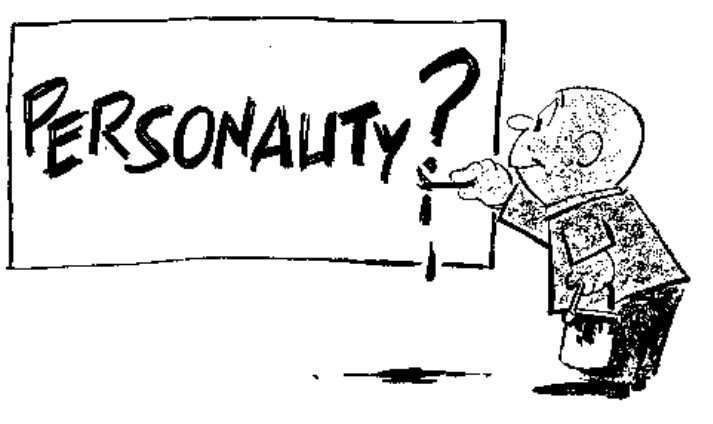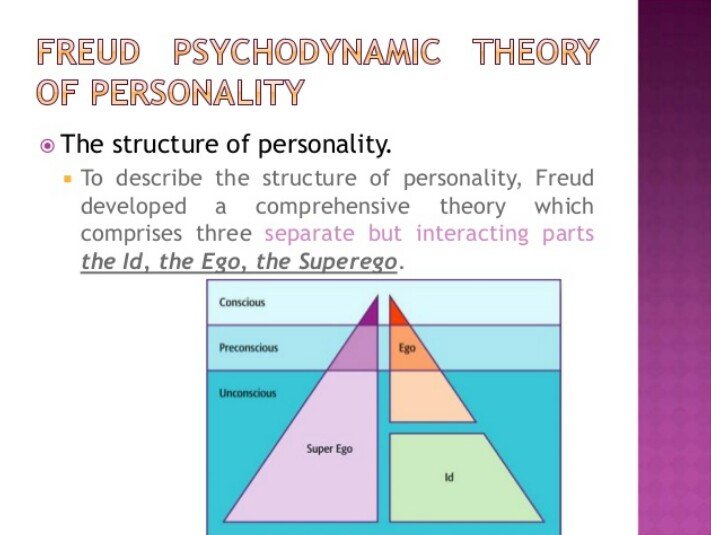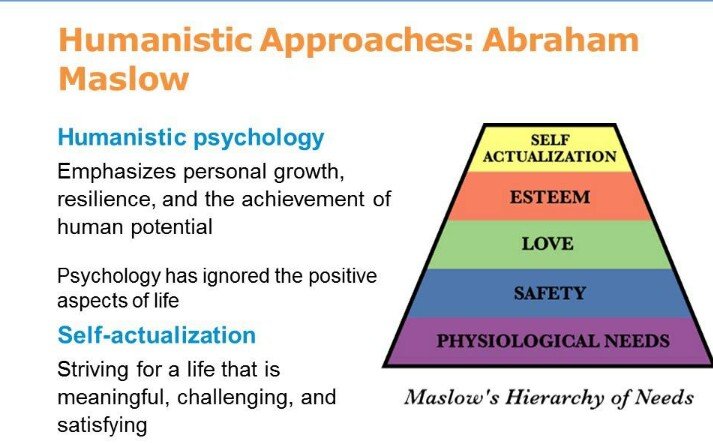There are many psychologists who have their own thoughts on personality and where one’s personality comes from but they do not agree on a single answer. A simple definition of personality that encompasses some common ideas is that it represents how one thinks and behaves as an individual. In this regard, it can also be said to characterise a person’s emotional demeanour.

childpsych.umwblogs.org
These aspects of one’s personality are generally consistent. The way personality traits are presented to others is the only way that an individual’s personality can be observed. Personality is not the physical appearance but rather what makes one emotionally different from another.
As there are so many theories one can choose from to digest and discuss, for now I thought I'll introduce two personality theories and will compare and contrast them. The chosen two are as follows:
Psychodynamic theory: This theory suggests that personality is significantly a result of unconsciousness. It is hinged on the dynamic relationship between unconscious and conscious drives; suggesting that a person does not have control of his or her mind nor is a master of their own mind. Of particular emphasis in psychodynamic theory is the idea that events and behaviour from an individual’s childhood affect the choices and behaviour of the individual in adulthood. Examples include how an individual approaches conflict and manages desires.

slideshare.net
Humanistic theory: This theory suggests personality to be a conscious result of control by the individual. The individual creates their own destiny and has free will. The humanistic approach emphasises the existential and interpersonal such as values, choices, purpose and the concept of self motivation as a deliberate characteristic by which an individual may pursue self improvement or attempt to reach their potential.

youtube.com
The main identifying features of Freud’s psychodynamic theory are tabulated in the first column of Table 1 below. Each entry is paired by an entry in the second column that illustrates the comparison with the Humanistic theory:
| Psychodynamic theory | Humanistic theory |
|---|---|
| Psychodynamic theory argues that behaviour is a result of unconscious force. | Humanistic theory suggests that human nature strives towards personal growth as a matter of conscious effort. |
| Psychodynamic theory suggests that an adult’s personality is strongly defined by their childhood experiences. | Humanistic theory promotes the idea that humans have free will and direct their own course of action without strong influence from childhood experiences. |
| Psychodynamic theory describes how an individual’s personality is shaped by the way they cope with their urges; especially those of a sexual nature. | Humanistic theory advocates the conscious and rational traits of a being, not irrational needs and urges. |
The basis of psychodynamic theory is that human behaviour and personality is not controlled by an individual’s consciousness but rather is the outcome of three components illustrated by the research of Sigmund Freud. I'll address these components later. In contrast to this, the humanistic theory suggests that a human being has unique qualities in their personality that come about through their free will and deliberate self development.
To contrast these differences, the theories have to be outlined in some depth, but as delving into personalities are a big topic in themselves let alone how in depth these two theories can be I will be making this introduction as part one of three. keep a look out for part two on Psychodynamic theory.
Its really good you brought out the various theorem from scholars in terms of personality. Though I have read textbooks while in colleage on human behaviour and there is topic on personality and the likes of Abraham Maslow,sigmud Freud,mc Gregor and lot talked about personality but the one i found about it was the id,ego and superego perspective which really signifies the conscious,preconcious and unconcious mind andni learnt the unconscious mind the what we do without thinking that's what we do while dreaming,like reciting some memorable poem we have learnt alot, and much more, and for.Maslow where I got captivating is self-actualization with the fact that your personality is built on what one achieve i.e fulfilling his or her goal..not to explain much,the topic on human behaviour ia wide and sure i really had interest on personality as a topic because i saw alittle of myself while reading..thanks for this information and taking me back knowledge lane .share much more and we steemains and especially myself will appreciate it..
Stay tuned @clarkk, the id,ego and superego are coming! Yes it's a fascinating field that's for sure. Thank you for the effort you put into your reply!
Any personality test is just useful for the person who performed the test. Many companies, trainer and people use personality tests to develop people or evaluated them but it doesnt work that way for real...
If you want to have some personal test for free visit I think like 16personalities.com it is not perfectly accurate but can give you some view of urself if ur not aware of it :-)
I've heard Stephan Molyneux suggest that companies would get the most accurate indication of future performance by administering IQ tests rather than skills or personality tests when interviewing. They don't however as doing so would narrow demographics and race which would open themselves up for accusations of discrimination. Interesting!
It could maybe work for interviews, but higher IQ test doesnt mean you are able to do something which someone with lower IQ cannot... cause you need people who have enough potential for the position in the company, if it is higher they wont be happy there.. and personality tests are just for one person if someone doesnt know everything about himself/herself... for development and people analysis we created the tool which really works and is built from facts connected to the leader/team/company not just the one person...
Hi @rhoty. That's interesting. I think the theory with the IQ test for statistically better employees is that there's a higher likelihood that they can learn and adapt to things they don't know; something you're often confronted with in a workplace. There's definitely however a need for a skillset suitable as a foundation though as you say.
I agree. On the other hand, with IQ, the problem is, if you are on totally high level in some category of IQ your adaptability si worse than the average, and sometimes worse than people below average, because simplicity could be problem - it is similair bot the same as autism/asperger problems. From my experience, if you could find some tme and read something about me (I ll be pleased) my communication - verbal/nonverbal IQ is at 136 from my last test 2 years ago. In fact I know how to communicate with people on different levels, different age or according to topics from football, sports, to science, technologies or books etc... but I experience moments when I am out of some communication with people because it is not about I am not able to understand, but my thinking process according to some communication makes me that I dont want to and it is barrier which can someone cause more "problem" "issues" than for people who are below average and they are not able to understand.
I think you should include mentally and emotionally different from others
Also the Psychodynamic theory. Is not correct.
Nice thought
Hi @royalz. What do you mean by "Also the Psychodynamic theory. Is not correct."? This piece is actually original work written as part of a university level assignment which received good grades so I'm keen to learn where the inaccuracy comes from. This is a quick summary of a deep topic.
No what i mean is that i don't belive the psychodynamic theory is not correct because personalitydoes not depend on those stuff it describe. I woud go with the Humanistic theory.
You did a good job..puting those piece together...i nice
Intresting post...keep up the good work
i would say both theories are correct depending upon the IQ of the individual. Those of lower IQ's of say 110 and below would fit the Freudian Psycho dynamic theory as these sheeple lack the ability to constructively self criticise their own development through life - this manifests itself with the need to buy stuff they don't need, dependency upon the state and their personality is a collective of TV personalities.
Those of higher IQ fit the Humanistic Theory better as they have the ability to comprehend their relativity in a given sequence of events which means they make less mistakes and are generally more successful in life. Their personality is drawn from their high IQ peers. Its interesting that neither theory includes IQ as a factor in personality traits when i believe it to be a main driver - Those of low IQ of around 80 and below have a more violent and aggressive personality and they are easily manipulated. But then i could be nuts and need a shrink :)
Hi @realtreebivvy. It is interesting you mention IQ and that many people including experts tend to dislike psychodynamic theory and much of Freud's work. I personally love his process.
So about IQ You are right that those with low IQ tend to have a violent streak. However these theories, can be used with all IQ's as it is meant only to help understand where one comes from.. their experiences and how they work and respond to situations.
So Freud believed we are born with a primitive principle that can end up controlling us.. If this state, the id, does control us then it is possible to have a low IQ. Because the id is all about immediate gratification it can stunt our emotional growth and that can become a ripple effect, impacting the IQ. However if all three states are at play in our life, mind etc one can grow healthy and have an IQ that is reachable by that person..
He also believed that how we are brought up impacts what principles (Id, ego and superego) are effected, therefor creating our personality with healthy semi healthy or not healthy and all the in between.
I believe that if each theory is used correctly with a existential process each theory can benefit an individual
Hi @beulinator :) i don't now anything about psychology, so this is all new to me - if you want to know about fishing, i'm your man :) Ok - so was Freud saying that our "animal side" of our personality is genetic? That would make sense as violent temperament is often bred out of animals such as wolves to make dogs, so why should we be any different - and whether we act or succumb to our "animal side", is dependant upon a stable environment ie our up-bringing, the better the up-bringing, the less likely we are to act out aggressively- that kinda makes sense too. People tend to follow in the footsteps of their parents, good parents = good kids. Other side of the coin / Abused tend to abuse etc... But then schools are also a big influencing factor on how to behave - mob mentality, programmed in by the state from an early age, taught what to think not how to think - I think i need to read a book on this to get up to speed - after iv'e done mote in gods eye. Thank you for the reply :)
Haha well I've never fished in my life @realtreebivvy, so I'm useless there😉.
Yeah I'd agree with your explanation, there are always exceptions to the rule and you can delve deeper into the theories which clarifies things and can also confuse things. 😯
Tho you can breed the wolf and minimise the violent temperament as we see in dogs...it will always be there.
Yes, the acting on our "animal side" can be influenced by our environment. But there are exceptions to the rule everywhere we step.
Freud does also talk about how abuse or parental mistakes influence the person.
Eg oral fixation seen at age 0-1give or take. Freud believed that if the infant has a bad experience with transitioning from breast feeding to 'solids' they can become fixated with things in their mouth.. Nail biting, finger sucking and smoking are a few examples. You may be able to go further here and say it can affect personality as it can be seen as an anxious responese..anxious person. He also goes on about 6-12yrs and that answers the social contact aspect with same age people.
I work well under Freud's work as I can see how right he is about the id, ego and superego creating your character from experiences.
My superego, use to control a lot of how I was (which can be as damaging as the id) .. However through learning these principles over time I was able to change some of my personality and I had to change my environment to succeed.
@nolnocluap has posted the second one which explains more on the id ego and superego. So if you want to learn more have a look. I may see you in that thread too.. 😊
Wow @realtreebivvy for someone new to the field you have really quickly adopted a good foundation! It's a huge field and you can keep going further and further in depth. It is nice when things just start to "make sense". I completely agree that the state (which has it's hands in everything) acts to intervene in what would otherwise be healthy psychological development. Social inputs are certainly a factor. Thanks for the great contribution!
I'm more agree with " Humanistic Theory" !
Nice write up,you did a good job by explaining the theories of personality.Hope you will post more of this soon.
Thanks @vik3 for the kind reply. I plan to!
People are interesting, everyone is different yet people often have similar personality traits....fascinating post =)
Much appreciated @creativo thank you!
Only a pleasure, I hope more Steemians read your blog post, its very interesting
😆
=)
I like Muslow's work (being an OT) but think it is both. I agree with the concept of the humanist approach and am of the free will mind set, but also we are massively conditioned but our past experience. One of these factor is our schooling and the media we are exposed to at a young (all really) age.
Also with every individual being different some are more susceptible to conditioning where as others are not but equally this conditioning can be reversed. There is also the element of being able to unconditioning people ourselves through learning.
I am also of the opinion the our genes are part of our parents so some of there conditioning is also thrown into the mix and of past generations ect. Hence things like fight or flight!
Its a mine field.💯🐒💯🐒